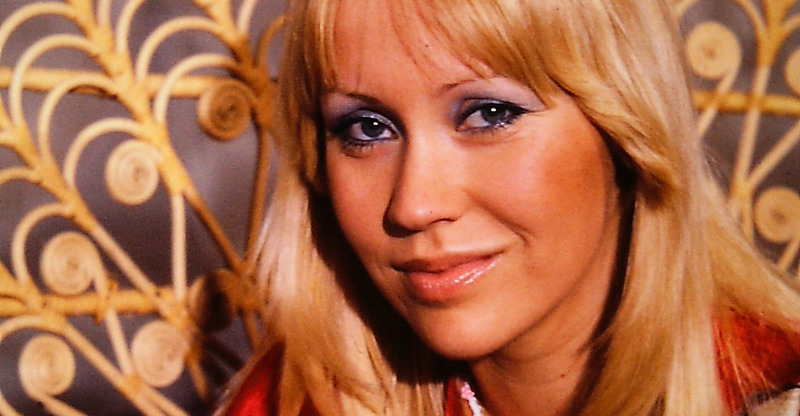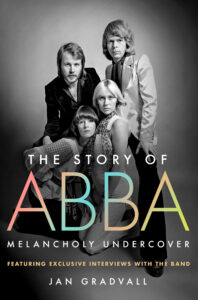
Life After ABBA: One Day in London With Agnetha Fältskog
Jan Gradvall Sits Down With the Lead Singer of the Iconic Swedish Pop Group
“I know this is considered heresy, but I like it best when it’s ice cold,” says Agnetha Fältskog, then looks around before spooning a couple of large ice cubes into her glass of Chablis.
We’re in the restaurant at the Corinthia hotel in London. It is May 2013. Agnetha will be living here for ten days while promoting her latest solo album A. Every other day she meets with media from all over the world. She has alternate days off, in order to be able to manage her schedule, work out and rest at the hotel spa, or take short walks in the West End and Soho.
What brings Agnetha the most joy on the streets of London isn’t all the trendy shops and people, but children and dogs. Her extensive knowledge of 1960s pop music is also in evidence: “Every time we hear some obscure song on the car radio, or at a restaurant, Agnetha is the one who nails exactly what it is,” says Peter Nordahl, one of her two producers on this album. Corinthia is located in Whitehall, where a large part of the work of the British government is done. Less than a ten-minute walk from here is the entrance to the subterranean bunker in which Winston Churchill led operations when Adolf Hitler was trying to bomb London to bits.
There is something electric about Agnetha. Everyone who recognizes her reacts the same way and pauses in their step.
Agnetha has checked into the hotel anonymously, but news has nonetheless spread to some of her fans. The people in charge of hotel guests are highly skilled at being attentive to the presence of a legend, while also acting as if nothing is out of the ordinary.
There is something electric about Agnetha. Everyone who recognizes her reacts the same way and pauses in their step, perhaps partly because she has been out of the spotlight for a couple of decades. This trip to London is Agnetha’s first stay abroad, as well as her first plane journey in decades. A journalist from one of Germany’s largest daily papers is told that his interview slot has been moved due to her packed schedule and that he will have to wait. He answers: “No worries. I can wait, I have waited thirty years for this.”
Having spent an entire day following Agnetha around, I conclude that there is nothing Garboesque about her behavior, although she is often portrayed that way. She is social, open (“I’m about to tell you something I’ve never told anyone before”) and curious about everything around her.
*
Agnetha’s best friend, Lolo Murray, is with her at the restaurant table. She works as a personal consultant to some of Sweden’s biggest artists, with a hand in everything to do with appearance—hair, make-up, clothes. She has worked with Agnetha ahead of every album and appearance she has done since 1980.
“It began when I did a styling gig with Agnetha and Frida for Clic magazine,” says Lolo Murray. “Then I got an offer on short notice to come to Japan with Abba when they were on tour there. Once, when I was rushing to do a quick costume change on Agnetha during a show, I accidentally put her skirt on upside down. ‘I’ll get fired now,’ I thought. But you”—here she puts her arm around Agnetha—”let me stay on. That was an incredibly fun tour.”
Agnetha and Lolo talk memories from Abba’s tours. At the time of this meeting the Abba Voyage project and the holograms that will be called “Abbatars” are still nine years in the future.
“Several people who interviewed me here have asked if there was rivalry between me and Frida,” Agnetha says. “But there was none of that. On the contrary, we helped and supported each other all the time, especially on tour. If one of us had a cold the other would step up and pull a heavier load in terms of singing. We always covered for each other.”
*
It has been a long day in London, prior to us having wine that evening. It started in the morning, when Agnetha was interviewed at the Abbey Road studio by a reporter from Today, the biggest and most prestigious morning TV show in the United States.
“I recognize this; I have been here before,” Agnetha said as she got out of the privately chauffeured car, wearing large black sunglasses, and stepped through the doors to the Beatles’ legendary recording studio. “Paul McCartney invited us over when we were here in the 1970s. We visited the studio, said hi and looked around.”
The Abbey Road studio was chosen as the location for this interview since the TV team wanted a more colorful environment than a hotel. And the connection to the Beatles is not far-fetched. In terms of pop history, that is the company in which Abba belongs. Q had recently called Abba “the most prominent pure pop band in musical history.”
The Today reporter, a local hire for the occasion, was so overexcited about getting to interview Agnetha that he talked more than she did. Some of the questions were more akin to lists of facts that emphasize Abba’s status as royalty in England. “How do you feel about Kate and William playing only Abba songs at the reception after their wedding? How does it feel that Queen Elizabeth loves ‘Dancing Queen’ and has quoted the lyrics?”
All of this was news to Agnetha, but she did her best to answer.
Unlike other great singers, she never shows off at the expense of the lyrics or engages in unnecessary warbling. Her presence alone can transform a song into a drama.
When being interviewed in English she spends some extra time thinking, searching for the right words, in a way that makes her appear more reserved than she really is. “During my time with Abba I was anxious about not being as good at English as the others,” she says.
What foreign reporters tend to know less about is how involved she was in Abba’s music. Agnetha is a skilled pianist. When Abba formed she was the only one of the four who could read music.
On her solo albums in the 1960s and early 1970s, Agnetha wrote most of her own songs. Out of a total of twenty songs to make Svensktoppen, eleven were her own compositions. A few weeks ahead of her visit to London she had been given the Swedish composer’s and songwriter’s guild SKAP’s award in the memory of Kai Gullmar. Kai Gullmar was Sweden’s first major female composer of popular music.
Björn and Benny encouraged Agnetha to write for Abba, but “there wasn’t much time left over for that.” Instead, she became Abba’s crystalline voice. Her style of singing is about so much more than technique. Unlike other great singers, she never shows off at the expense of the lyrics or engages in unnecessary warbling. Her presence alone can transform a song into a drama.
“It is always hard to speak to one’s own strengths,” she says of her ability to interpret lyrics. “I know that I can sing, that I can write. But what I’m really good at is understanding what a lyric is about. I always ask questions about the context of the lyric, enter into it, become the lyric.”
A bit like an actor would?
“Yes, more or less. Personally, I do think I became a better singer as I gained more life experience. You have so much you want to share. And my way of sharing is through song. That is where I put my feelings.”
__________________________________

From The Story of ABBA: Melancholy Undercover by Jan Gradvall. Copyright © 2025. Available from St. Martin’s Press, an imprint of Macmillan. Featured image: Pascal Carqueville, used under CC BY-SA 4.0
Jan Gradvall
Jan Gradvall is an award-winning writer and Sweden’s most respected music journalist in the last 40 years. He has written several books on popular culture. Gradvall is the recipient of the Swedish Publicists’ Association’s Grand Prize in 2013 for and won Journalist of the Year awarded by trade organization Sweden’s Magazines in 2001. Gradvall was also instrumental in the founding of the Swedish Music Hall of Fame and served as chairman the first three years since its inauguration. He has a uniquely close journalistic relationship with ABBA, and has appeared in two BBC documentaries, The Joy of ABBA and Flatpack Pop about the Swedish songwriting phenomenon.



















